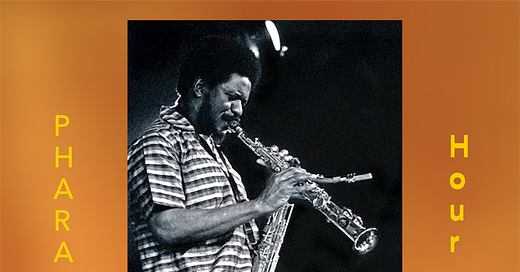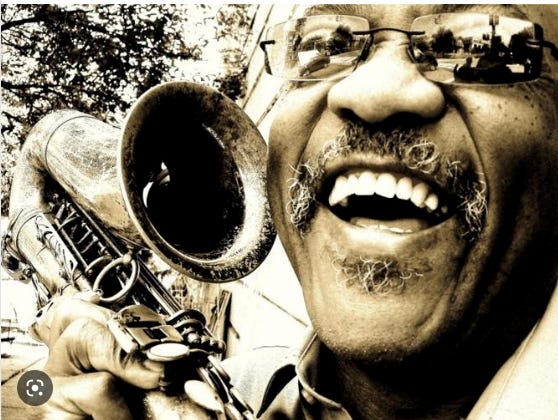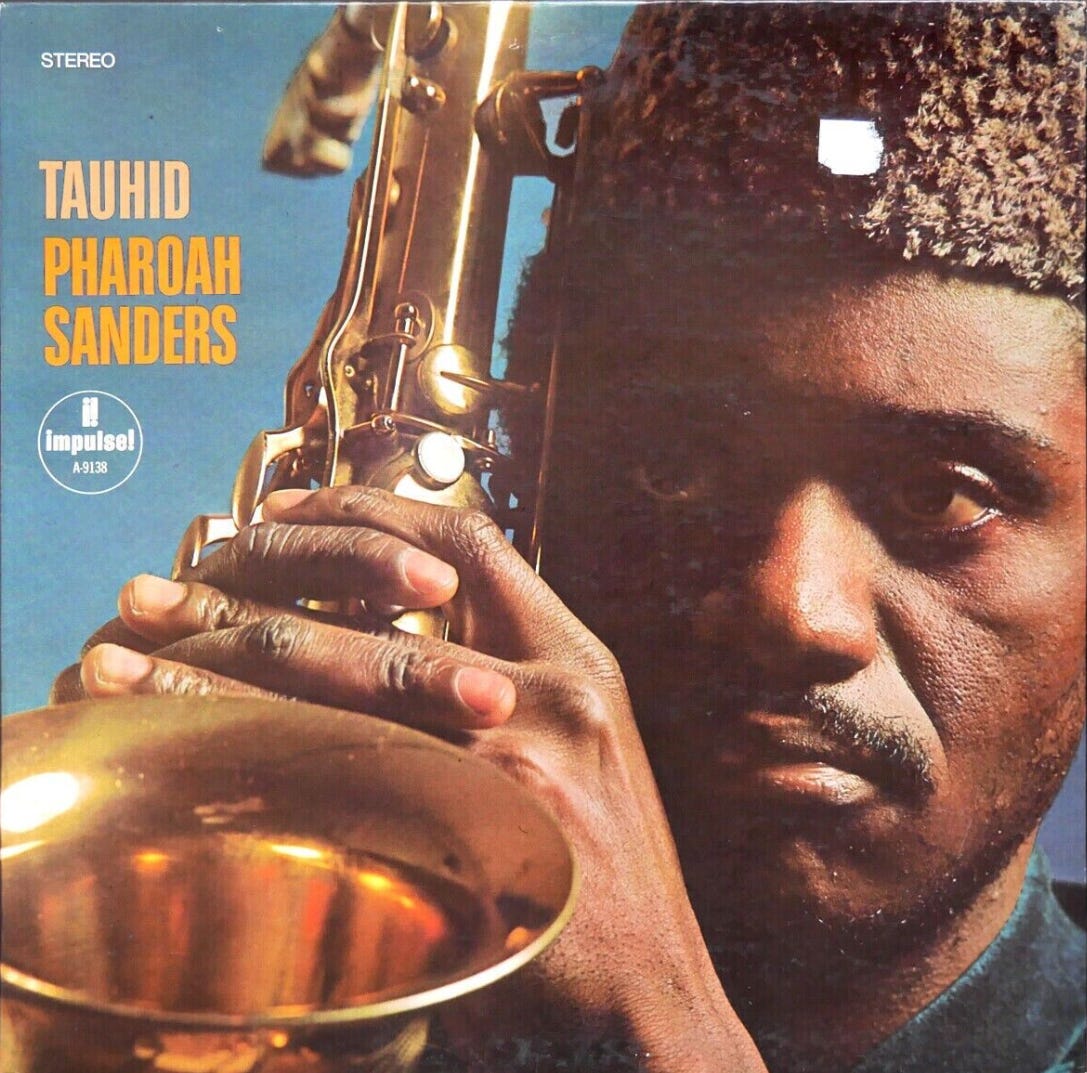PHARAOH Hour 1 in a Tribute to Pharaoh Sanders and His Peers
Maryse Philippe Déjean reaches out to honor the magnificent Pharaoh Sanders over New Orleans' WWOZ. 7 Tracks of music. With eloquence from William Parker, Oliver Lake and Jean Fineberg. BANDCAMP here!
(Many thanks for the news Subscriptions! I hope that you enjoy the music and the company of Pharaoh Sanders and peers of his! Please let me know the Bandcamp link works and any responses that you have to share.)
In this Hour you’ll hear voices that are about as much unlike the WEF-Speak that postures and slithers through the World Enslavement Forum as voices can be. They include: William Parker—”And it was different than Albert Ayler’s saxophone, it was different than Frank Wright’s saxophone, and it was, just, it was frighteningly beautiful. And strong. And spiritual. “ Oliver Lake—” Well, for one thing his sound is so beautiful and so distinct. Once you hear him play, once he picks up on his horn, you know who it is from his sound.” Jean Fineberg: “It blew me away, and that was when I decided i had to learn how to make those sounds on the saxophone.”
BANDCAMP with play for you the entire Hour. 0:00
“The Creator Has A Master Plan”, overture, performed by Pharaoh, Hamid Drake, Alex Blake, and William Henderson III in Leverkusen, Germany. 1999.
WILLIAM PARKER: “He could put you on your right path and remind you of what life was about. And it was bigger, much bigger, than just playing a 12-bar Blues, or getting your changes right, or playing “Giant Steps.” It was about finding your relationship in the world, with the Creator, and with Creation.”
MARYSE to OLIVER LAKE: “What do you hope the world remembers about Pharaoh Sanders?”
OLIVER: “Well, you know, recently I’ve been listening to some of his recordings and some of his sayings, as well. And it comes down, to me, to a four-letter word called Love. I think, hope, that the world will know that the most important thing is love. And Pharaoh was emphasizing that throughout all of his music—about love.”
JEAN FINEBERG: “It just—it just rocked my world. It blew me away because I had never heard anyone play the tenor saxophone like that. You know, I was familiar with Ornette Coleman on alto, but to hear it on my instrument, the tenor, was just mind-blowing.”
1. Pharoah Sanders. Hamid Drake, Alex Blake, and William Henderson III live in Leverkusen, Germany 1999—excerpt from “The Creator Has A Master Plan”
1:00
MARYSE: “Today we’re SO glad to begin the first of our Hours on Pharaoh Sanders. We just heard bassist William Parker, saxophonist Oliver Lake, and multi-instrumentalist Jean Fineberg share their impressions of Pharaoh Sanders, accompanied by a short clip from 1999. That was Pharaoh live in Germany with Hamid Drake, Alex Blake on bass, and William Henderson the Third on piano.
Next, we’ll hear the track called “Love” on John Coltrane’s album of 1965, titled Meditations.
2:03
2. “Love” (8:03) on John Coltrane’s album Meditations, recorded November 23, 1965 with • John Coltrane – tenor saxophone, percussion, band leader
• Pharoah Sanders – tenor saxophone, percussion
• McCoy Tyner – piano
• Jimmy Garrison – double bass
• Elvin Jones – drums
• Rashied Ali – drums
• Emmanuel Rahim, percussion
10:12
Christian McBride and William in 2012.
WILLIAM PARKER: “This is William Parker, and you’re listening to W-W-O-Z.org.”
MARYSE: “Welcome, William Parker, to W-W-O-Z..”
WILLIAM: “Thank you. Glad to be here.”
MARYSE: “Well, It’s so great to have this conversation with you. We are presenting a tribute on Pharaoh Sanders. We would like to know how Pharaoh Sanders’ music may have affected you in any way.”
WILLIAM: “Well, when I was coming up, listening to the music in the late ‘60s and early 70s, I was very much moved by recordings of John Coltrane, particularly A Love Supreme, and then after that there was a recording that came out on Impulse called Meditations. And this was the first time that I heard Pharaoh, on that particular recording. And as we were listening—I mean we, musicians, I was hanging out with Billy Bang, Roy Campbell, it was like: Who is this guy, playing the saxophone?
And it was different than Albert Ayler’s saxophone, it was different than Frank Wright’s saxophone, and it was, just, it was frighteningly beautiful. And strong. And spiritual.
Because we were talking, you know, “The Father, Son, the Holy Ghost”, “Meditations”, “Compassion”, “Love”—those were of the titles on that record. Then later on ‘Trane released an album called Cosmic Music that also had a little Pharaoh on it. Also, Alice Coltrane, after Trane’s passing, used Pharaoh on some of her recordings.
12:06
3. “Turiya and Ramikrishna” (8:12) on Alice Coltrane’s album Ptah, the El Daoud, recorded January 26, 1970 in her Long Island house’s basement with • Alice Coltrane — harp (on track 3), piano
• Pharoah Sanders — tenor sax (on tracks 1 & 4, right channel), alto flute (on track 3), bells
• Joe Henderson — tenor sax (on tracks 1 & 4, left channel), alto flute (on track 3)
• Ron Carter — bass
• Ben Riley — drums
20:20
WILLIAM: “But it was his … recording on Impulse, called Karma, that really really really set the revolutionary stance for what life is about. And on that one we had “The Creator Has A Master Plan”.
And that was the mantra. You’d come home from whatever you were at—school, or doing whatever you were doing, and immediately put that record on. And that was the message. If you were going on that path, and looking for meaning to life, Pharaoh laid it out. It wasn’t like “All Blues” didn’t lay it out, or “My Funny Valentine”, but Pharaoh was saying: The Creator Has a Master Plan. And you heard Leon Thomas on that record. Lonnie Liston Smith. Ron Carter. Richard Davis. I think Reggie Workman is on one side of that record. And it was just a great, great—for me, it was a record that changed my life.”
21:33
Pharaoh Sanders and Leon Thomas.
4. Excerpt (11:27) from “The Creator Has A Master Plan” on Pharoah Sanders’ February 14 and 15. 1969 Karma with • Pharoah Sanders — tenor saxophone
• Leon Thomas — vocal, percussion
• Julius Watkins — french horn
• James Spaulding — flute on "The Creator Has a Master Plan"
• Lonnie Liston Smith — piano
• Reggie Workman — bass
• Richard Davis — bass on "The Creator Has a Master Plan"
• Ron Carter — bass on "Colors"
• Billy Hart — drums on "The Creator Has a Master Plan"
• Freddie Waits — drums on "Colors"
• Nathaniel Bettis — percussion on "The Creator Has a Master Plan"
•
32:00
OLIVER LAKE: “This is Oliver Lake, and you’re listening to W-W-O-Z.
MARYSE: “Mr. Oliver Lake. Thank you very much for agreeing to do this with us today on WWOZ.”
OLIVER: “My pleasure.”
MARYSE: “When did you become aware of Pharaoh Sanders?
OLIVER: “Oh, early in my career, and it was early in his career. We were pretty much near the same age. He was a year older than me. I grew up in St. Louis. I heard of him when he was working with Coltrane. I guess that was in the 60s.”
MARYSE: “And what particularly caught your attention about the way he played?”
OLIVER: “Well, for one thing his sound is so beautiful and so distinct. Once you hear him play, once he picks up on his horn, you know who it is from his sound. His sound was one of the main things I liked about his playing.”
33:00
5. “Tse’lane” (5:40) on Oliver Lake’s 1971 in St. Louis ’ NTU: The Point From Which Creations Begins with
Alto Saxophone, Soprano Saxophone, Flute – Oliver Lake
Art Direction – Bob Heimall*
Artwork – Dennis Pohl
Congas – Don Moye*
Coordinator [U.S. Production] – Michael Cuscuna, Steve Backer
Design – Nancy Greenberg
Drums – Charles Bobo Shaw
Electric Bass – Don Officer
Electric Piano – Clovis Bordeux
Guitar – Richard Martin (3)
Instruments [Small Instruments] – Baikida E. J. Carroll*, Floyd LeFlore, Joseph Bowie, Oliver Lake
Mixed By – Baikida E. J. Carroll*, Oliver Lake
Photography By – Raymond Ross
Piano – John Hicks
Producer – John Hicks
Trombone – Joseph Bowie
Trumpet – Baikida E. J. Carroll*, Floyd LeFlore
38:40
‘Overlay’, mixed-media on canvas, 8x10, Oliver Lake, available at https://www.oliverlake.net/art/
MARYSE: “And how would you describe that whole era, his playing with John Coltrane, and the movement of the music, and the expression of the saxophone within that music?”
OLIVER: “Well, the fact that everyone was exploring. Coltrane was exploring. Pharaoh was exploring. They were all trying to take the music forward and I also wanted to be part of that, as well, as I was growing up. So I was attracted to all the musicians who were making personal statements. And Pharaoh was one of the ones …”
39:12
6. Excerpts from “Sun in Aquarius, Part 1” on Pharaoh Sanders’ October 20.1969 Jewels Of Thought album with Pharoah Sanders – tenor saxophone, contrabass clarinet, reed flute, kalimba, orchestra chimes, percussion
Leon Thomas – vocals, percussion
Lonnie Liston Smith – piano, African flute, kalimba, percussion
Cecil McBee – bass, percussion
Richard Davis – bass, percussion (on #2-3 only)
Idris Muhammad – drums, percussion
49:30
MARYSE: “Jean Fineberg,, tell us when did you first hear about Pharaoh Sanders?
JEAN: “I first heard about him in the mid-60s… It just rocked my world. He blew me away because I had never heard anyone play the tenor saxophone like that. You know, I was familiar with Ornette Coleman on alto, but to hear it on my instrument, on the tenor, was just mind-blowing.”
MARYSE: “Can you put more words into that? What was it about the quality of his playing that touched you do deeply?”
JEAN: “Well, he made the saxophone sound in a way that I had never thought about having my horn say. But, since people say that the saxophone is the instrument closing to the human voice, and he made it sound more like the human voice. The anguish and the agony and also the incredible beauty of the human voice.more than any kind of melodic or harmonic treatment of the music. It blew me away, and that was when I decided i had to learn how to make those sounds on the saxophone. So what I did was, well, my teacher gave me Sigurd Roscher’s book, Top Tones for the Saxophone, which is a way you approach the Altissimo, all the notes that are not supposed to be in the range of the saxophone, but are much higher than that.”
51:00
7. Excerpt from “Aum/Venus/Capricorn Rising” on Pharaoh Sanders’ November 1966 album Tauhid with • Pharoah Sanders – tenor saxophone, alto saxophone, piccolo, vocals
• Nat Bettis – percussion
• Roger Blank – drums
• Dave Burrell – piano
• Henry Grimes – bass
• Sonny Sharrock – guitar


















